One of the largest topics of consideration for anyone studying the topic of Access to Information must revolve around the communication or acquisition of new knowledge.
As future librarians, and always as patrons, there is at some point in the quest for new knowledge a query. Whether we do our research independently from our home computers or in person at the local library, there is a point at which the jumbled mess of information and confusion in our own minds must be organized into a single, clear question. Unfortunately for most of us, the formulation of "the question," and getting the information you we are hoping to get does not usually happen on the first attempt. According to Belkin, this can be explained by the Anomalous State of Knowledge. We have all experienced this at some point and time. We get curious, (we're human, it's in our nature) but, the acquisition of knowledge must always be a journey. As such, it may take us a while to figure out what exactly it is we want to know.
Whether we ask another individual our thoughtfully formed question, or we ask a computer, our own contextual framework for the "topic" or the "issue" will inherently impact the way the question is asked... and unfortunately, we do not always fully understand the context for the questions we ask- making the answers ever more illusive.
For example, offhandedly one evening I wondered what the odd little "tables" inside of pizza delivery boxes were for? My experience with this odd object were limited to either throwing them away or using them as furniture for my dolls as a child. I had no idea how to find the answer to my question- I had no context for the piece except that it came in a pizza box and was plastic. Luckily for me, a lack of contextual fluency in the area of pizza packaging seemed to be a common problem and my particular question also a common one. By simply searching, "what are the little tables in the pizza box for?" I was able in a simple Google search to learn that these were "pizza savers" and that there was a convenient Wikipedia page describing their function. Thankfully, my question has been asked before and was easily searchable online. However, there are many other questions to ask that we (or our patrons) may not have enough context to investigate independently.
Once we pass the point of asking our questions in such a way that the answers we seek can be found, we enter a whole new world of discovery and exploration.
On one occasion a few months ago, I became curious of the topic of prayer, what religions adopted it, and in particular whether it was a part of Eastern traditions or not. On this particular occasion, I visited the library (anticipating that I would be interested enough in what I found to read some materials on the topic.) That day, I helped myself to the religion section of my local library and went on a "berry-picking" adventure.
I am well known for my escapades in area searching- finding a broad topic of interest (i.e. eastern religions and philosophies) and simply scanning titles on the shelf until I find myself with 15 books by various authors with varying levels of relevance to my initial inquiry. When I started with my question, I did not have enough context to ask more about the topic- I didn't know too much about important authors or terminologies for the things I wanted to know, but once I started scanning the shelves it was easy to see recurring patterns and identify materials which would be informative on the broader topic and also address my narrow question. This is the kind of self-education that I personally love. My mental schema works very much like the berry-picking model. I begin in one place and jump from broad topics to narrow, from well known authors to the obscure, and where my journey ends usually has little to do with where it began (but it's always successful because regardless of where I am in the end, my journey brought me knowledge I did not have before.)
Knowing how my own independent searches for knowledge typically unfold, I can only imagine how difficult I would be as a patron in a library (if I didn't just go browse independently.) I think I would change my question 5 times before the librarian could even help me find the sections I would need to be looking in. What I really like about Dervin's Sense Making Methodology (below) is that it really captures the spirit of information access that I personally appreciate- the action of discovery and personal growth through finding knowledge.
All searching for knowledge fills the "gaps" we have. We as information professionals have the privilege and the responsibility to help our patrons fill these gaps in their knowledge and assist them in carrying forward their own experience of living and learning- helping them to broaden and deepen their own personal context of living and interacting with the larger world. But, in order to help our patrons we have to continue to be aware of the process and evolution that is a part of accessing new information. Asking questions and actively searching with our patrons is a responsibility we have to take on in order to be truly successful at what we do.
Learning, like living, is best accomplished by continuous forward motion. As we live and learn, there is ever more living and learning to experience. To help someone else make that journey is to practice patience, openness, and communication from one personal context to another. While others may never perfect that art, we as library professional must strive to do so in order to best serve our patrons.

No comments:
Post a Comment